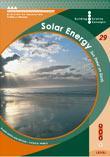You are here:
- Home »
- Teaching resources »
- Building Science Concepts »
- Titles and concept overviews »
- Solar Energy: Sun Power on Earth

Book 29: Solar Energy: Sun Power on Earth
Synopsis
The study of solar energy offers children a useful introduction to concepts about one of our world's few renewable energy sources. This book looks at what solar energy is, how it is used, and the technologies involved in "harnessing" and transforming energy from the Sun. At levels 5 to 6, another area of study linked to concepts of solar energy is the global warming of planet Earth and the depletion of the ozone layer. Energy units are often studied on a school-wide basis. This topic offers a choice of contexts for many activities from Levels 2 to 4. You can choose the context appropriate to your children; if you are teaching younger children, you may opt to bypass more complex activities. For example, the concept "The amounts of heat energy and light energy that reach Earth's surface vary according to the time of day, the weather, the time of year, and the place" can be investigated through activities related to the times of day and night for younger children, and extended to activities involving annual times (seasons) for more advanced children.
Concept overview
Use the concept overview, which is also on the inside front cover of the book, as a reference for the concepts that relate to Solar Energy: Sun Power on Earth.
![]() Read the concept overview
(PDF 59 KB)
Read the concept overview
(PDF 59 KB)
Links with other titles in the series
Because of the central importance of the Sun to life on Earth, this book links with many other books in the series, particularly:
-
Book 9: Shadows
(L1–2, Material World, Physical World, Planet Earth and Beyond)
for activities involving direct and shaded light
- Book 10: Light and Colour (L1–2, Physical World)
-
Book 11: Seeing Colours
(L3–4, Physical World)
for activities about reflection/absorption of light energy
-
Book 13: Aluminium
(L3–4, Material World, Planet Earth and Beyond)
for activities on the reflection of light and heat
- Book 15: Where's the Water? (L1–2, Material World, Physical World, Planet Earth and Beyond)
- Book 20: Our Star, the Sun (L1–2, Planet Earth and Beyond)
-
Book 31: Water and Weather
(L3–4, Material World, Physical World, Planet Earth and Beyond)
for the role of the Sun in the Water Cycle
-
Book 35: Is this a Plant?
(L1–2, Living World)
for the role of the Sun in plant growth
- Book 43: Spring (L1–2, Living World, Planet Earth and Beyond)
-
Book 44: Spring Is a Season
(L3–4, Living World, Planet Earth and Beyond)
for activities involving seasons
- Book 46: Keeping Warm (L1–2, Material World, Physical World)
-
Book 47: Insulation
(L3–4, Material World, Physical World)
for activities on reflection/absorption of heat energy
Assessment resources
Search the science section of the Assessment Resource Banks (ARB) website to find resources that assess the 'big idea' learning outcomes referred to in the concept overview for this title.

